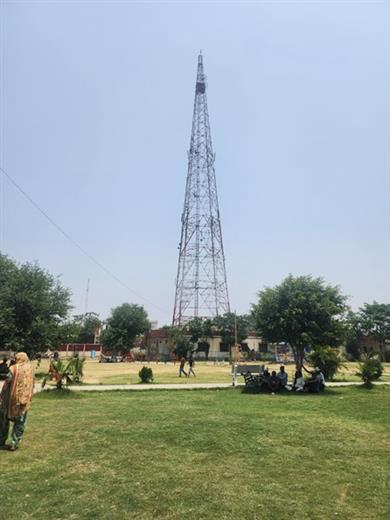By Jatinder Pal Singh
In the bustling town of Samana, Punjab, an extraordinary vigil has been underway for over eight months, largely unnoticed by the wider world. High atop a mobile tower, Gurjeet Singh Khalsa has transformed a perilous perch into a solitary "morcha" – both a sentry post and a silent agitation. His demand is stark, yet profoundly significant for the peace and communal harmony of Punjab: a robust law mandating harsh punishment for anyone who commits sacrilege against holy scriptures.
Gurjeet Singh Khalsa’s protest began in earnest around late October 2024, and since then, he has endured the biting cold of winter, the scorching heat of summer, and the constant threat of his precarious position. Compounding his ordeal, reports indicate his health is deteriorating, with him suffering from ailments like typhoid. Yet, his resolve remains unshaken, a testament to the depth of his conviction and the feeling that all other avenues have been exhausted.
This is a protest driven by principle, devoid of any economic demands on the government or a specific religious organization. There are no calls for subsidies, no demands for jobs, no appeals for financial aid. The entire focus is on a legislative amendment that would ensure justice for deeply revered religious texts and, by extension, the sentiments of millions. In fact, if the Punjab government were to heed this call, it would not incur any financial burden; instead, it would garner immense goodwill across the state and potentially even the country. By acting decisively, the government would be seen as sensitive to the profound spiritual beliefs of its citizens and responsive to a critical social concern.
The protest’s coordinator, Gurpreet Singh, a non-political figure, emphasizes the neutral nature of this agitation. Their plea is simple: make sacrilege a crime with severe consequences.
This is an issue that transcends political affiliations and has no negative implications social or religious, yet its social impact on the state’s fabric is undeniable. Incidents of sacrilege have, in the past, deeply wounded communal harmony and sparked widespread unrest. We only need to recall the chilling events following the Bargari sacrilege in 2015, which tragically culminated in the Behbal Kalan firing, where two protestors lost their lives. That incident, a direct outcome of unchecked frustration over sacrilege cases, profoundly affected the political fortunes of the then-ruling Akali Dal, demonstrating the immense power of this issue to shape the state's future.

The demand for a stronger law on sacrilege has been lingering in the corridors of power. It's an open secret that the file concerning this critical issue lies with the Punjab government. Any elected member of the legislative assembly, acting on behalf of the public, could have introduced a bill or moved a resolution in the assembly to address this. If legislative hurdles at the state level persisted, the matter could have even been taken up with the central government, emphasizing the unique and sensitive nature of these crimes in Punjab.
This peaceful struggle by Gurjeet Singh Khalsa is a crucial test of our democracy. In an era where sensationalism often dictates media narratives, quiet perseverance like this rarely gets the sustained spotlight it deserves. The continuous neglect by mainstream media means that for most of society, life carries on as usual. Their daily schedules remain unaffected, and the urgency of a man risking his health and life high above goes largely unacknowledged. This societal indifference is a worrying symptom, indicating a disconnect between the public and the very principles of justice that form the bedrock of a civil society.
History offers numerous examples of how peaceful resistance, though often initially overlooked, eventually compels change. From Mahatma Gandhi’s non-violent movements that ultimately led to India’s independence, to the women’s suffrage movement in the early 20th century, which endured decades of peaceful protests, picketing, and lobbying, the power of persistent, peaceful agitation is undeniable. These movements highlight that the absence of violence does not equate to a lack of urgency or significance.
The outcome of this "morcha" in Samana will set a critical tone for the future of peaceful protest in Punjab and beyond. If the government demonstrates sensitivity and responsiveness, it will not only resolve the immediate crisis but also build trust, encouraging citizens to express grievances through democratic and non-violent means. It is in the undeniable interest of the state and society to address this issue swiftly and compassionately. A strong, clear statement from the government, outlining concrete steps towards passing the desired legislation, is urgently needed. Such an assurance would not only bring Gurjeet Singh Khalsa down from his dangerous perch but would also send a powerful message that in Punjab, justice, even when sought peacefully, will not be denied.